The Ultimate Guide To Race Day Nutrition
- March 11, 2019
- Last Updated: December 28, 2024
- 10 Comments
- Running
This post on race day nutrition is going to be the first of a series of sports nutrition posts coming to the blog, just in time for spring marathon season. Because let’s face it…eating for marathon training is just as important as the race itself!
If you’re wondering what to eat on race day, what to eat before a long run or race, or what to eat after a race, this post is for you.
Maybe you’ve experimented with some different snack and meal options but haven’t found the ideal combination. Or maybe you’re tweaking your marathon training nutrition plan and need some guidance.
Table of contents
A DIETITIAN IN YOUR POCKET?!
Are you always hungry?! This is the sports nutrition resource you’ve been missing in your training and every day life. Here’s you can make sure you’re eating enough for daily life, performance and recovery. – grab it now!
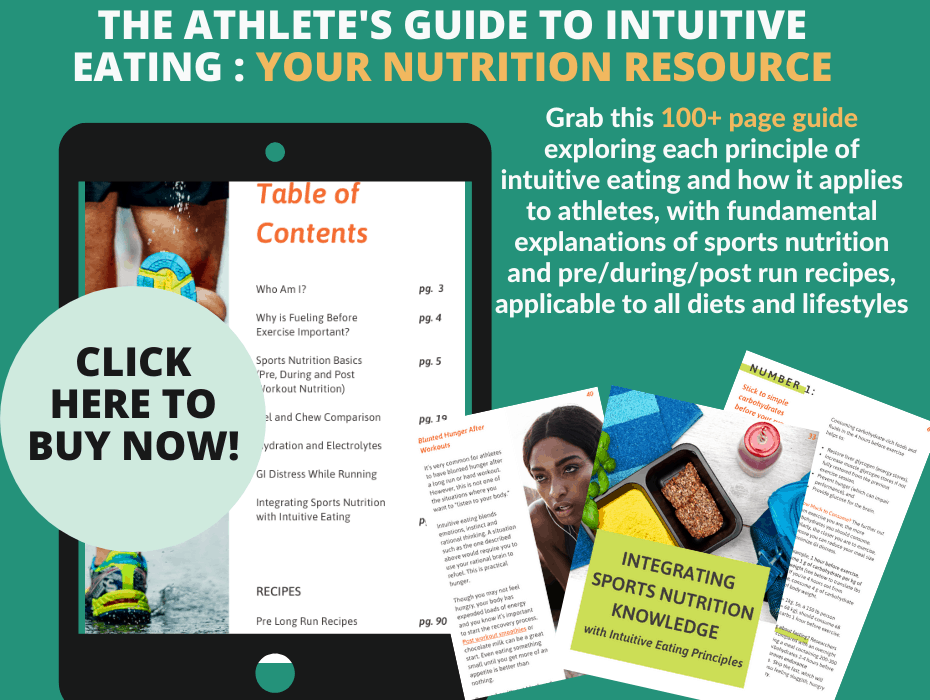
As an Amazon Affiliate, I may earn from qualifying purchases. This does not change your price of purchasing, it just helps me reinvest in the blog so it can remain free to you.
What To Eat Before Running
First and foremost, it’s important to remember that we are all different, so while these recommendations are general and may work for the majority of runners for race day, they may not work for you.
Nutritional requirements for marathon runners can be very individual, though needs are much higher than the average person.
It’s best to practice a few different methods to see what works for you, or meet with a dietitian who specializes in sports nutrition (like me) to personalize your race day nutrition plan. Race day meals can be very customizable.
In this post on ideas for a race day breakfast, I talk about how to customize your breakfast and some recipe ideas. Plenty more ideas of what to eat before a race.
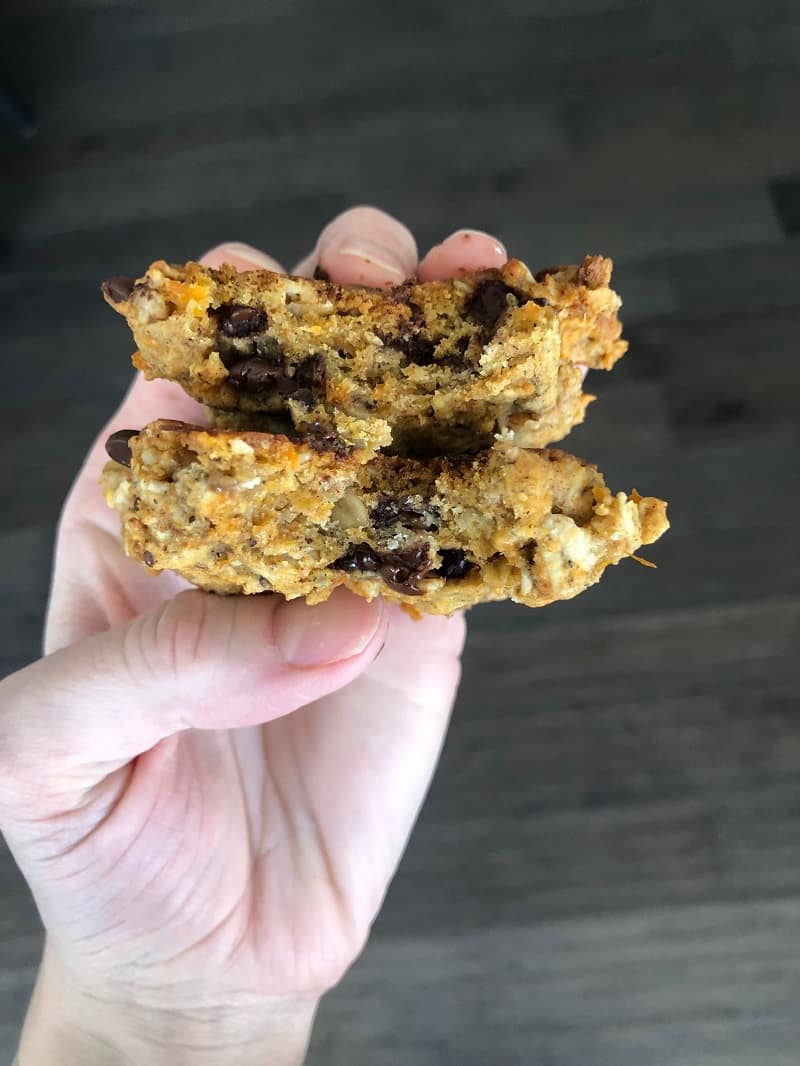
What should you drink before a marathon? Water or a carb-based drink. And, if you’re considering drinking coffee before running, know that caffeine and running can work well together.
In terms of what to eat before a race, nutrition strategies may vary depending on how long your race is.
Generally speaking, no matter what distance you’re running, carbohydrates are pretty much the best food to eat before a run.
They should comprise the majority of your pre-race meal or snack.
In terms of marathon nutrition, your race day breakfast sets the stage for your muscles to perform.
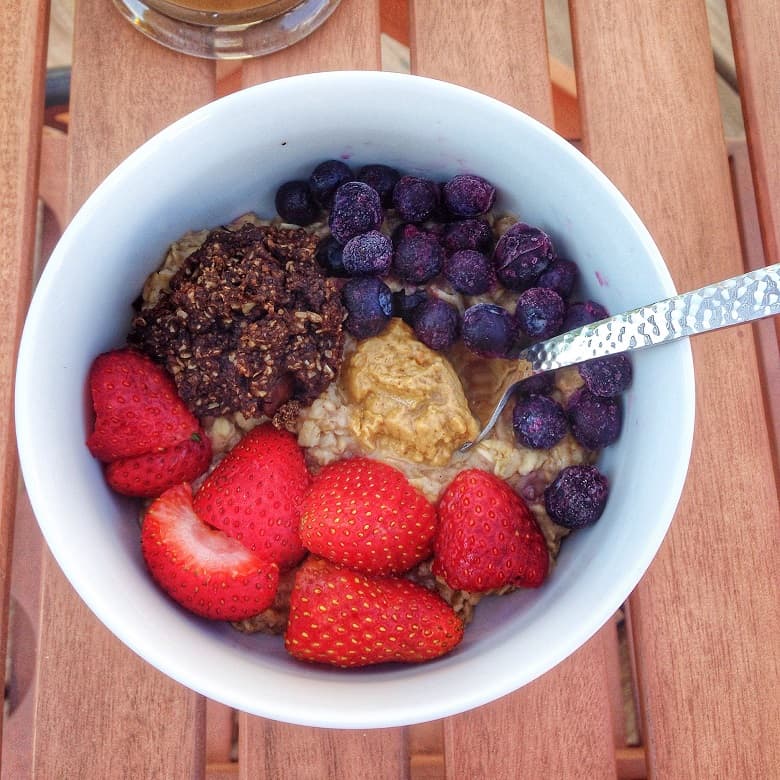
Carbohydrates are the quickest energy sources for our body to use, and provide fuel for the brain and central nervous system as well. Most can be digested quickly and easily, making them the best food to eat before a run.
Here are some of the best meals for carb loading.
Compared to fat, carbohydrates yield a much greater amount of ATP (aka energy) per volume of oxygen, which helps improve exercise efficiency. This is why I don’t recommend a low carb diet for runners.
This post goes into more details about the fueling differences for shorter and longer races but let’s recap them below for this pre race meal plan.
Another resource to look at is this sample long distance runner diet plan.
Pre Race Day Meals For Shorter Races
Looking for what to eat before race day 10k? If you’re planning for a race under an hour, you don’t necessarily need to have a huge pre-race meal, but again, you should know what works for you.
Generally speaking, plan to eat a balanced breakfast 1-2 hours beforehand.
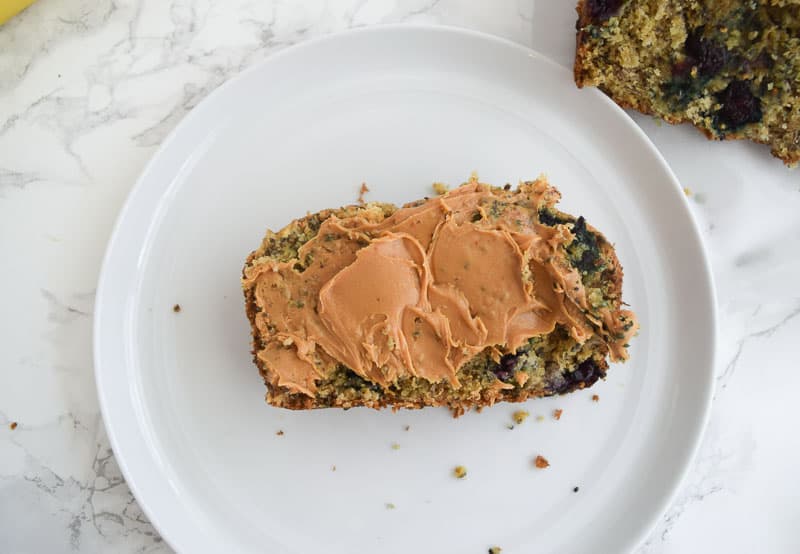
By balanced, I mean carbohydrate-based with a tiny bit of protein/fat for satiety. Most runners stray from high fiber options, which can create discomfort and indigestion, in the pre race meal.
Some good race day nutrition breakfast options:
- Oatmeal with fruit and peanut butter (overnight oats and sweet potato baked oatmeal can be great too!)
- Toast with peanut butter and a banana
- Granola with yogurt (I would recommend a low-fat, sweetened yogurt for extra carbs) and save the protein granola for post run!
- Half a bagel with a little cream cheese or peanut butter
- UCAN energy bars
- Leftover Oatmeal Cookies – easy to grab and go
- Cereal with milk
- Stroop waffles with some peanut butter (if you like something lighter)
- 5 Ingredient Peanut Butter Energy bites (can be great so you can personalize based on your taste preferences)
My go to breakfast the morning of a race is oatmeal or toast with peanut butter and raisins.
What To Eat The Night Before a Race
Again, choose a predominantly carbohydrate-based meal, with low fiber and some protein if you’re looking for what to eat the night before a half marathon.
Ideally, you’ve been carb loading before the race a couple days before.
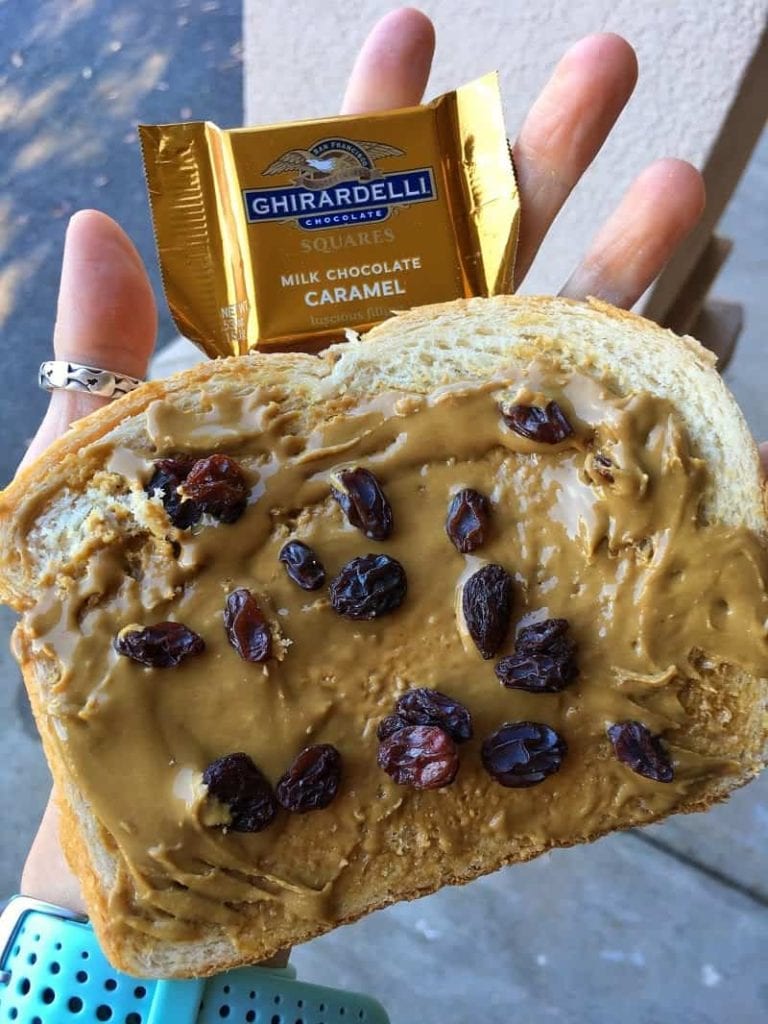
Some of my favorite night before a race meal recipes include this veggie pasta bake, sweet potato turkey burgers on a bun (more carbs!), or an egg noodle stir fry without most of the veggies.
What to Eat the Morning of a Longer Race
If you’re gearing up for a longer race, like a half marathon or marathon, your marathon nutrition plan (or pre-race nutrition) and strategy may look a little different.
I don’t think it’s necessary to count carbohydrates and overly focus on it, but if you are a numbers person, the general recommendation for pre-exercise carbohydrates is 1-4 grams of carbohydrates per kg of body weight.
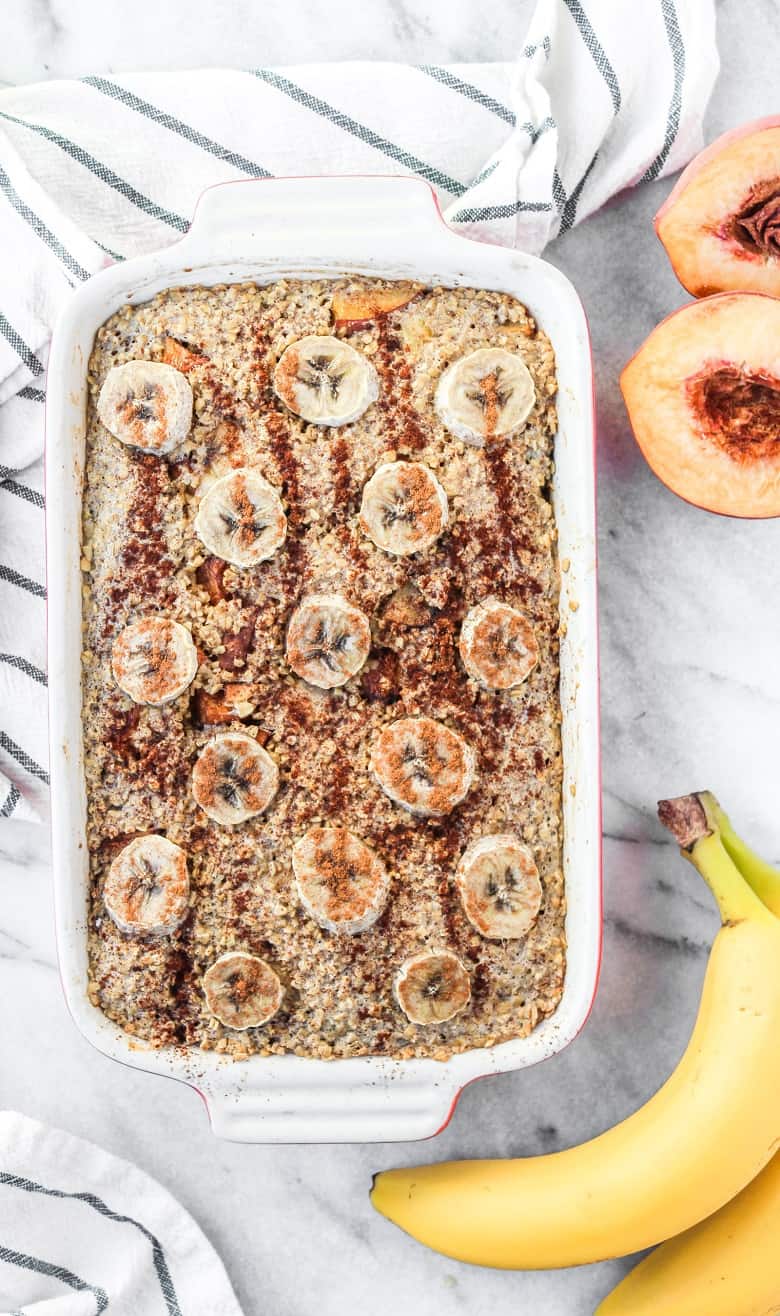
This has been shown to enhance endurance or performance of prolonged exercise.
I will say, most of my clients tend to not get enough carbohydrates in their diets, so race day breakfast is a great opportunity to capitalize.
Marathon Race Day Breakfast
Before a half marathon, I prefer to have an average-sized breakfast (like mentioned above) 2-3 hours before.
Then, I’ll have a smaller snack closer to the starting time for my marathon race day nutrition plan.
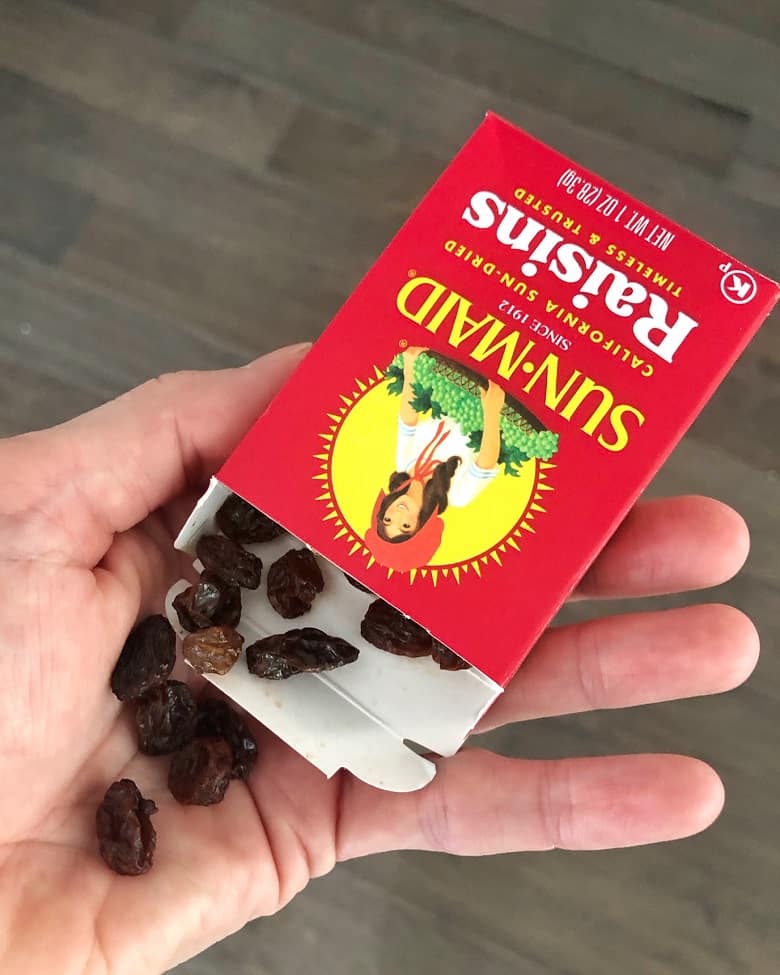
For the smaller snack, it’s strictly carbohydrate-based for that energy boost.
Smaller snack ideas for the pre race meal:
- banana
- cereal or granola
- crackers
- energy gel
- energy chews
- sour raisins
- dried fruit
- a piece of toast (white toast may be tolerated better than whole wheat toast)
So, my marathon race day breakfast looks like a bowl of oatmeal with banana and peanut butter, and then another half of banana or piece of dried fruit or some toast.
If you’re someone who doesn’t like anything in your stomach before a race, consider liquid carbohydrates.
While Gatorade is always an option, some people prefer less sweet electrolyte beverages or you can make your own.
UCAN (no sugar, and made with superstarch) and Tailwind are some of my favorites for carbohydrates, calories and electrolytes, but there are others on the market too.
If you’re running in the morning (which most races are), you do want to have something in your tank.
According to the Position Paper from the Academy of Nutrition and Dietetics, “carbohydrate consumed in meals and/or snacks during the 1-4 hours pre-exercise may continue to increase body glycogen stores, particularly liver glycogen levels that have been depleted by the overnight fast.“
UCAN can also help those who have a sensitive stomach while running or are sensitive to sugar. It utilizes superstarch (basically, a slow releasing carbohydrate) rather than quick-acting sugar.
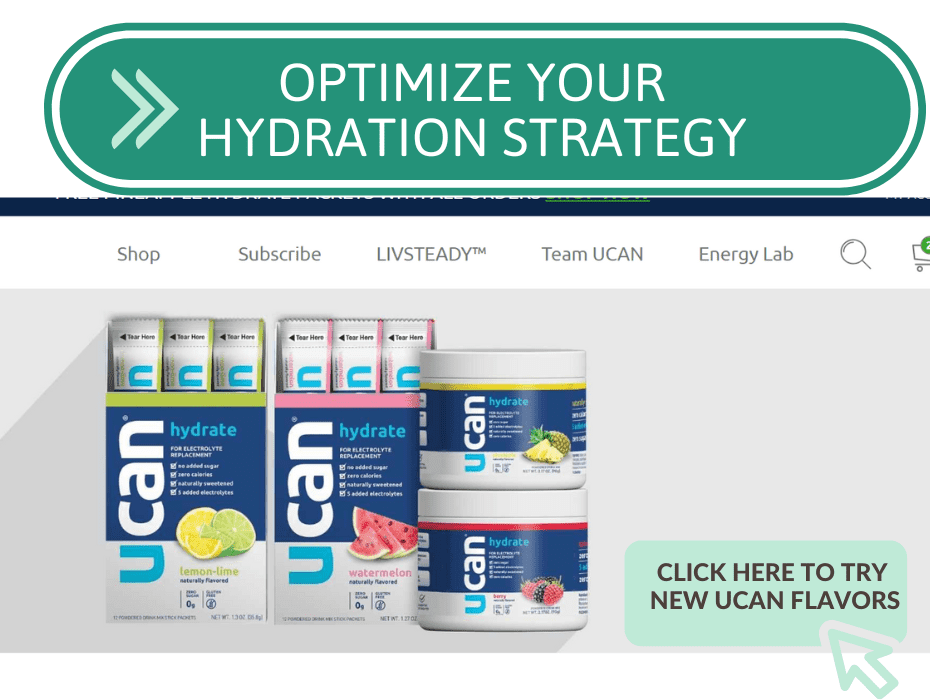
Fueling During a Race
What foods should you eat during a race? The best food to eat during a marathon is something you’ve tested several times (ideally months in advance) and that sits well with you!
For shorter races (5k, 10k), it’s probably not necessary to take in any fuel during a run.
Of course, much of this will depend on your pre race meal and what you ate the day before a race as well.
Generally speaking (assuming you had a balance pre-race snack and eat sufficient carbohydrates in your daily diet), you should have sufficient muscle glycogen stores to last the race.
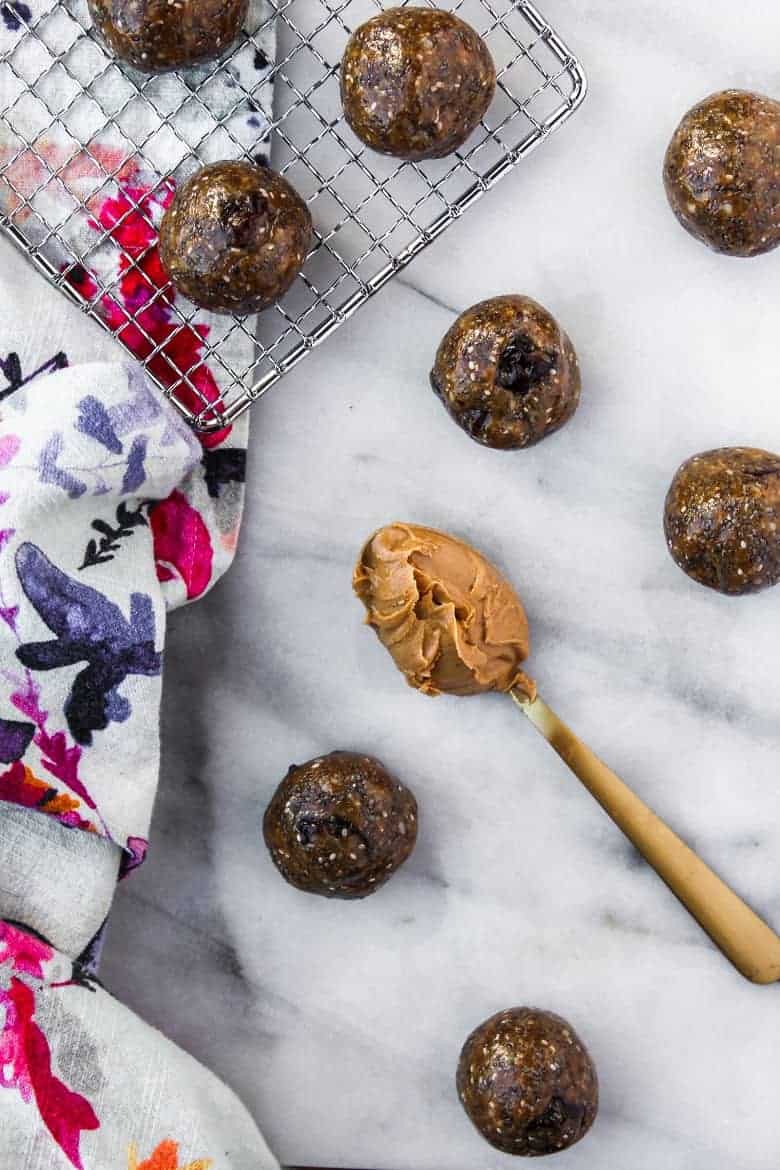
However, if you’re someone who doesn’t eat anything in a pre-race meal (see above why I don’t recommend that), it may be prudent to include something small right before the start or within the early miles.
You would want this to be something quickly digested (simple carbohydrates), so a gel would be ideal.
I love the Gu salted watermelon for a one and done.
But, I will say that shorter runs can be a great time to train the gut to take in fuel before longer runs and races, and a good chance to practice before eating during a marathon.
A DIETITIAN IN YOUR POCKET?!
Are you always hungry?! This is the sports nutrition resource you’ve been missing in your training and every day life. Here’s you can make sure you’re eating enough for daily life, performance and recovery. – grab it now!

Longer Races and How Marathon Nutrition Can Impact Performance
Unless you’re doing an ultramarathon or very long distance race, you probably don’t need to ever take in anything other than carbohydrates (and electrolytes and water) for your marathon food plan.
Protein, fat and fiber will only serve to slow digestion and may lead to cramping and stomach discomfort.
Let’s talk more about what to take during a marathon because marathon nutrition can make a significant impact on performance.
Carbohydrate intake during exercise can provide many performance benefits, such as preventing hypoglycemia (low blood sugar), preventing depleted glycogen stores.
There’s even research that just a mouth rinse of something carbohydrate-based can activate reward centers in the central nervous system, which may enhance performance and pacing strategies.
This is according to some of the newer research, but I’m sure there’s lots more to come.
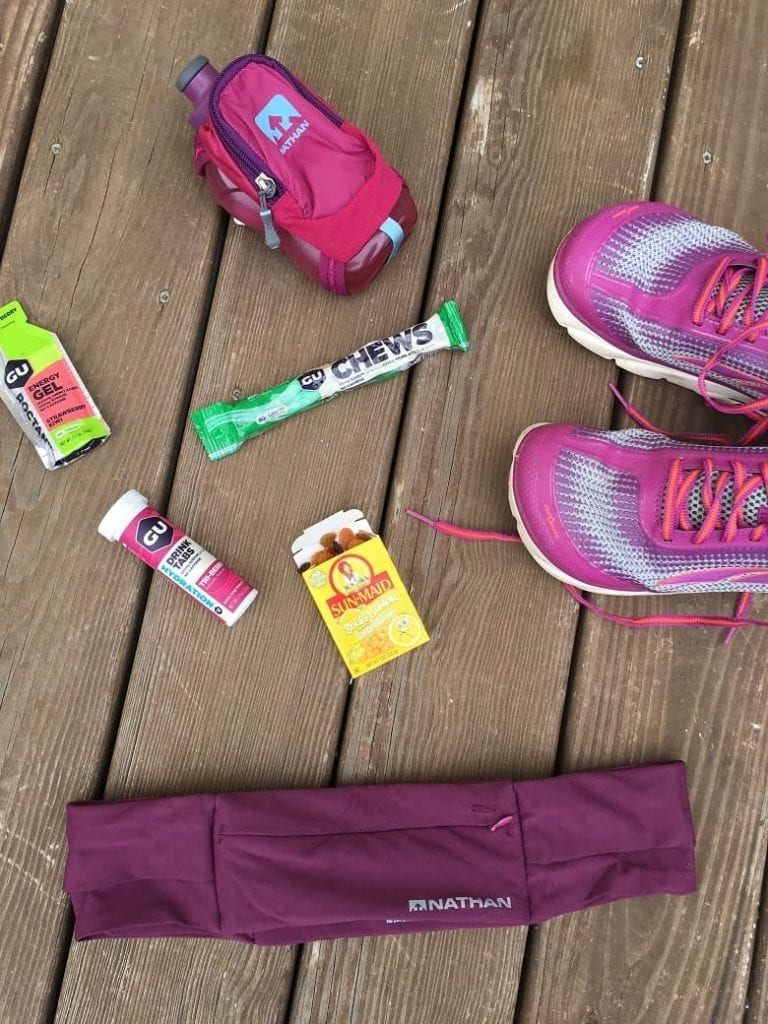
I 1000% encourage my clients to practice fueling during longer runs with whatever nutrition sources they plan to use to know what to eat on race day. This makes your marathon nutrition plan much easier!
This is a more recent account of what to eat on a 20 mile run.
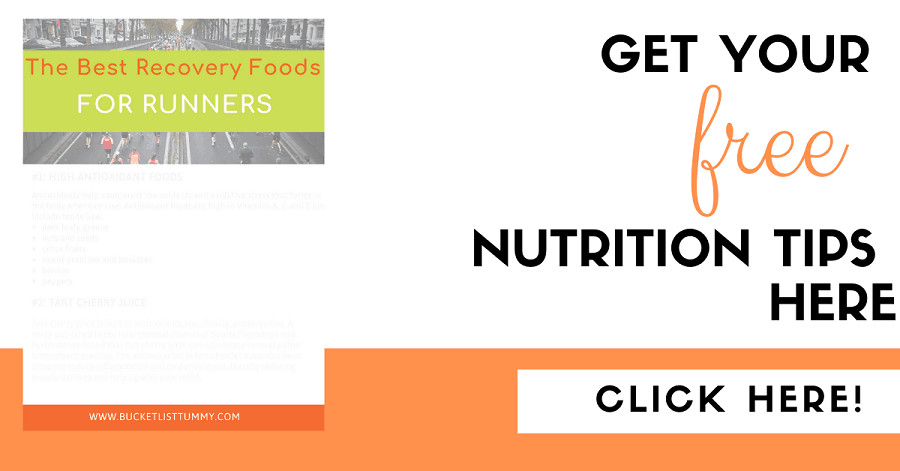
How Many Carbohydrates Should You Eat?
If you suffer from stomach discomfort with certain types of fuel during exercise, keep experimenting. There are so many different forms available, from 100% liquid based, to gels, to chews, to blocks to real food ideas, like tart cherry gummies.
I’ve written a post on runner’s gut for stomach issues and what to try if you have stomach discomfort during running, too.
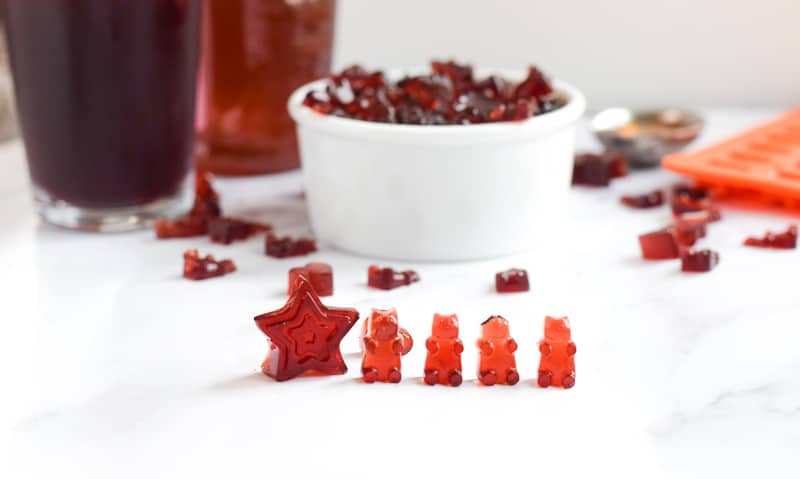
Ideally, you have been amping up your muscle glycogen stores (in other words, carb loading) before the race so you have some backup reserve that may last you longer.
I usually recommend to my runners to start with 30-60 grams of carbohydrates per hour over 75 minutes. Obviously, test this on your training runs.
This could mean about 2-3 gels/hour, or half gel every 10 minutes, whatever works.
I recommend taking gels at regular intervals (ie every 3-5 miles, or if you’re time-based, every 20-30 minutes) so your brain and body are receiving a steady flow of glucose.
Electrolytes and Hydration
Don’t underestimate the importance of electrolytes and hydration.
What are the important electrolytes for runners? You want to focus mostly on sodium, in your sports products, drinks, and general diet. If you’re a salty sweater, you will likely need higher amounts of sodium and liquid.
Fortunately, many of the carbohydrate sources you choose will also have electrolytes in them. You just want to make sure you’re taking in enough water alongside these sources.
I’ve written about the necessary water intake for athletes so I’ll refer you to that.
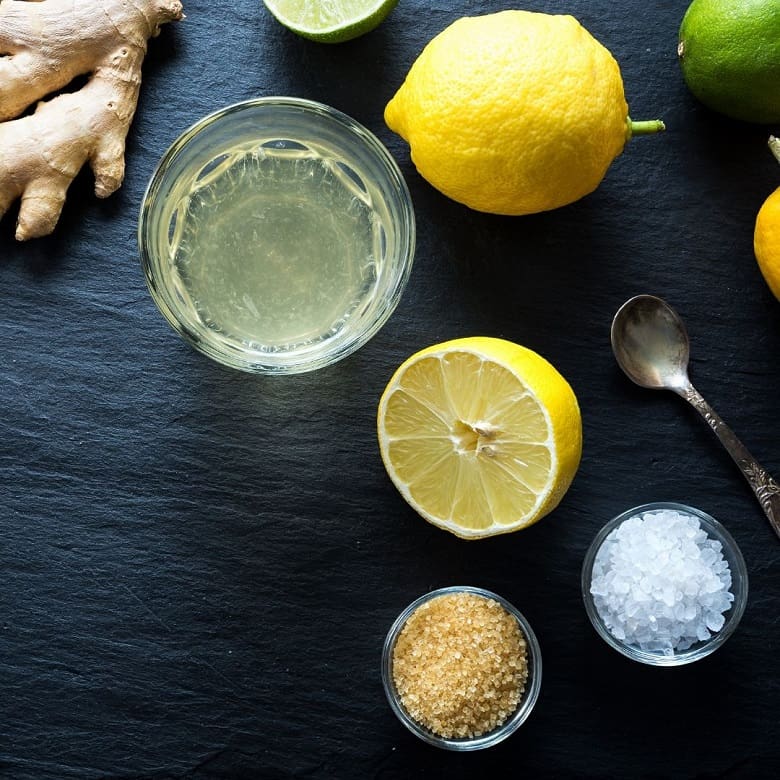
For taste and performance, these packets are great!
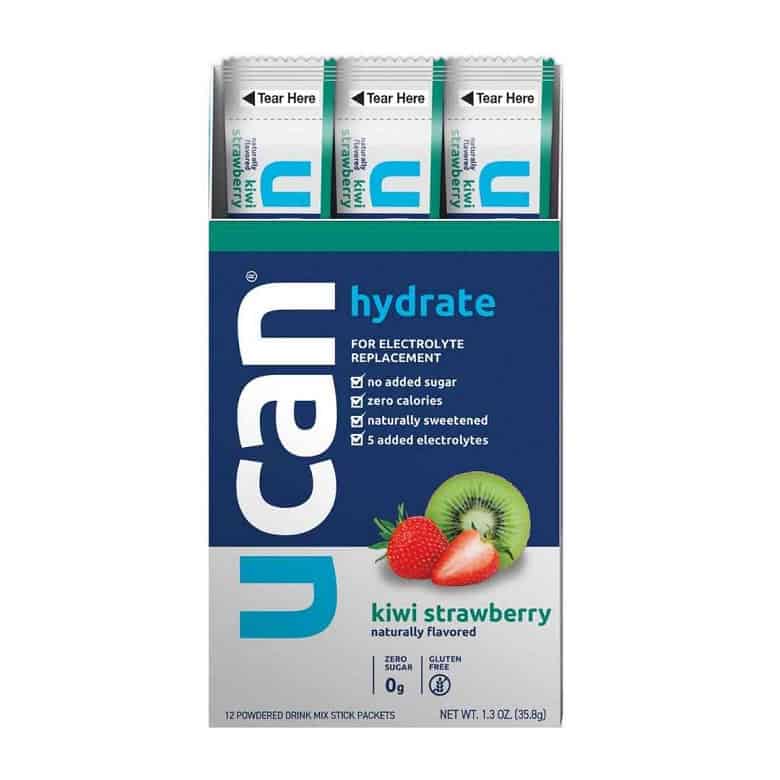
If you know you are a salty sweater, consider taking salt tabs (these are great) before or during your run, or choosing a re-run snack with sufficient sodium. Some examples are bread with salted peanut butter, soup, milk, nuts and deli meats.
Post Race Meal and Recovery
While it’s a common question of, “what to eat before a marathon,” in my opinion, the post race meal is one of the most important pieces for runners to understand and implement in their race day nutrition strategy.
Why Is Post Race Nutrition Important for Recovery?
Immediately after exercise, our muscles are primed to assimilate and build protein from amino acids from the blood. After exercise, our muscles are also most efficient at absorbing carbohydrates. The amino acids replenish and build protein stores, while the carbohydrates refill our glycogen stores.
Carbohydrates also stimulate insulin, an anabolic hormone that helps with muscle building and bringing carbohydrates into the muscles.
Ideally, you want a 3:1-4:1 ratio of carbohydrates to protein. Yes – you want more carbohydrates than protein. Your body can only absorb a certain amount of protein at once, so loading up your smoothie with 50 grams of protein is pretty futile.
A little bit more about the optimal combination in this post about how nutrition helps with recovery.
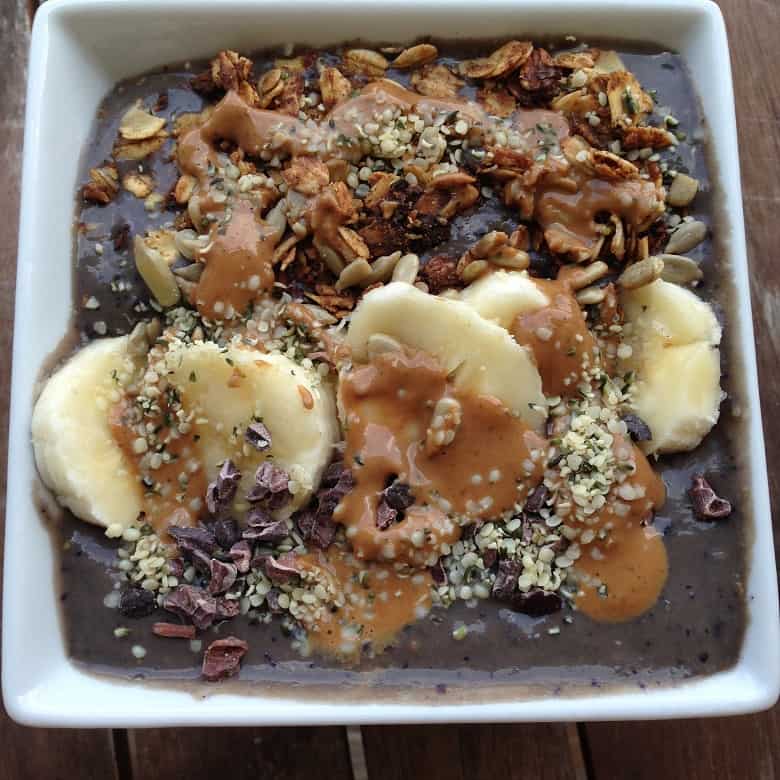
The best food for recovery after running? Ideally, a mixture of carbs and protein, but the best food to eat after a long run is….anything that you can stomach. Eating something is often better than nothing.
Do I need to eat immediately after exercise?
I talk a little bit more about timing in my sports nutrition FAQ post. In short, it’s not as vital as we once thought to refuel within 30 minutes.
However, I am of the opinion that the sooner we do, the better. I say this for many reasons. (More in this Women’s Running post I wrote).
Food helps with recovery for many reasons, some of which include:
- replenish glycogen stores
- restore energy reserves
- rebuild protein stores
- maintain blood sugar
- decrease inflammation
- improve immunity
The post race meal will accomplish these things quicker if it is consumed quicker.
Shorter Races
Honestly, I don’t see too much of a difference in the short term between shorter and longer races. It’s the days after that also make a difference for longer races. As you probably know if you’ve run a half marathon or full marathon before, it takes days to recover.
There may be delayed muscle soreness, and your appetite may be very high for days after the race. All of this is part of the recovery process, as well as making sure to eat adequately, and foods that can help your recovery.
If you live close to home or where you’ll get a meal after, you can probably just have that meal serve as your post-run snack/fueling. It’s not as necessary to have a designated post-run snack for a shorter race, like a 5k. This is because you likely have some glycogen reserves still left that you have not depleted.
However, I say that with the caveat that if you’re hungry, you should eat.
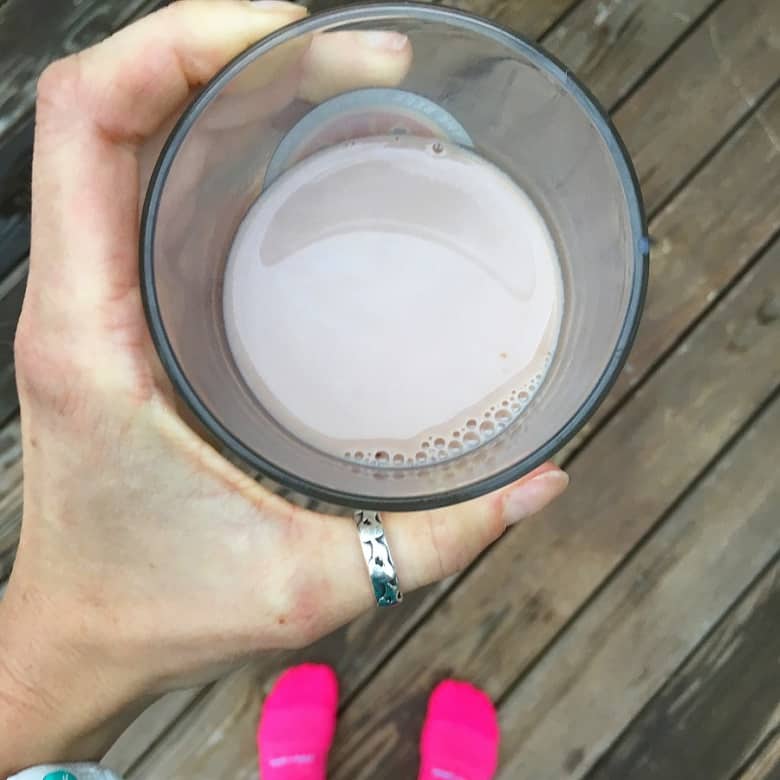
Longer Races
After longer races, I’ve found through working with athletes that it’s more common for appetites to be blunted. A liquid drink may be easier to digest before thinking about a meal. Smoothies, chocolate milk, lemonade, gatorade, sports drinks or other electrolyte drinks can work.
Other snack ideas to have shortly after your run include:
- chocolate milk (dairy or soy will give protein; non-dairy milk can work, too, but you won’t have the protein)
- Pre-made protein shakes are great for traveling (and to pair with fruit)
- anything with whey or cow’s milk
- banana with pb
- yogurt with fruit
- granola bar (ideally, one with more carbohydrates, like Lara bars or Kashi bars)
- sweet potato energy bites
- I prefer to stick with recovery food sources that are high in antioxidants, which help with the recovery process in post race nutrition.
Sweet potatoes, mangos, blueberries and eggs are great options. Sweet potato blueberry baked oatmeal is my favorite.
Prefer a vegan athlete meal plan? Click!
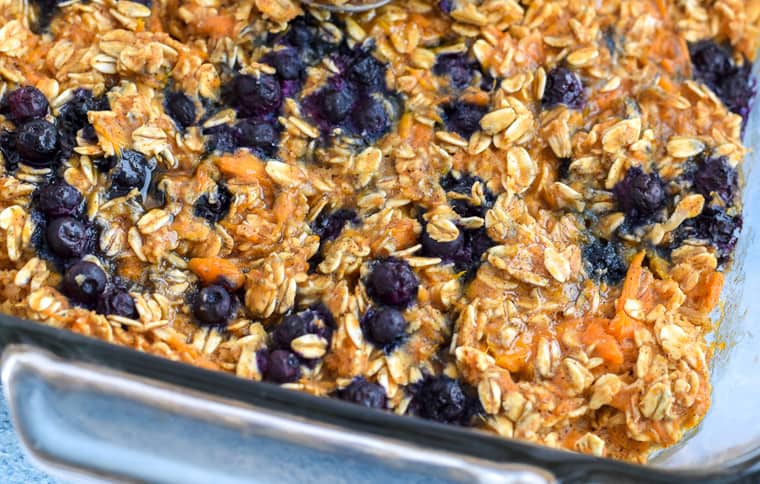
Balanced meal ideas:
- eggs and toast (antioxidant-rich veggies are a plus)
- Salmon patties
- breakfast pizza or a skillet meal
- oatmeal (add eggs/milk/yogurt/protein powder for extra protein)
- sweet potato burgers
- baked oatmeal with peanut butter
- asparagus mushroom quiche (eggs are a great source of protein, and paired with toast makes for quick carbohydrates. Plus, veggies = antioxidants)
- Butcher Box with grains/vegetables
More From The Marathon Training Series
- Sports Nutrition Myths
- Pre workout vs Post workout nutrition
- Easy Meals for Marathon Training
- Low Carb Diets for Runners
- Summer Hydration for Runners
- The best recovery foods for runners
- Recovery After a Half Marathon
- My Marathon Nutrition Plan
What does your race day nutrition plan look like?
Support Bucket List Tummy

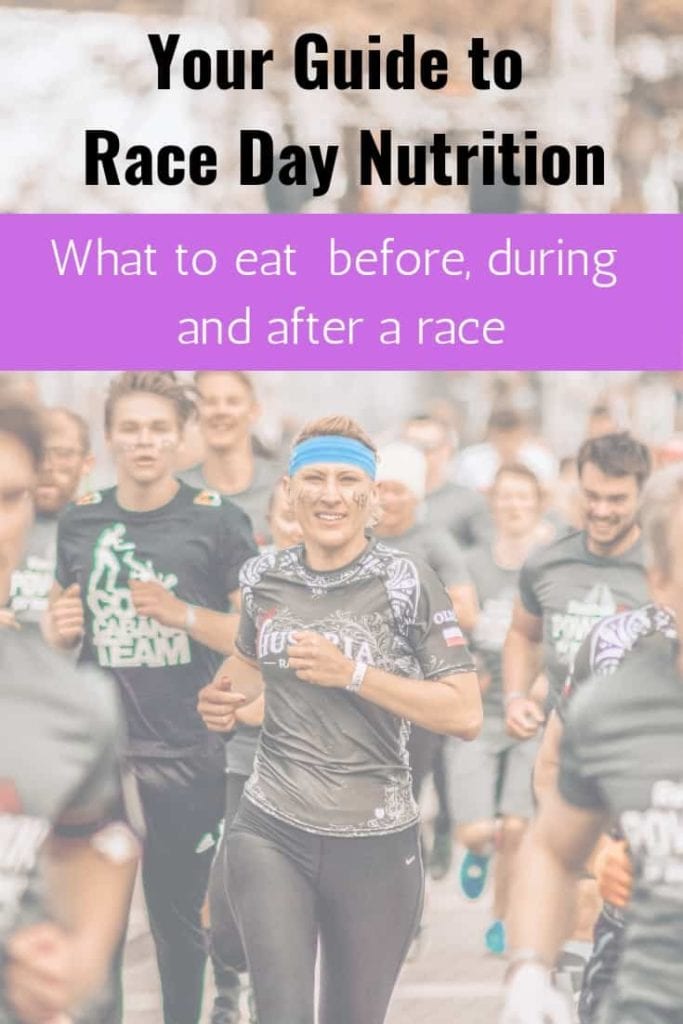


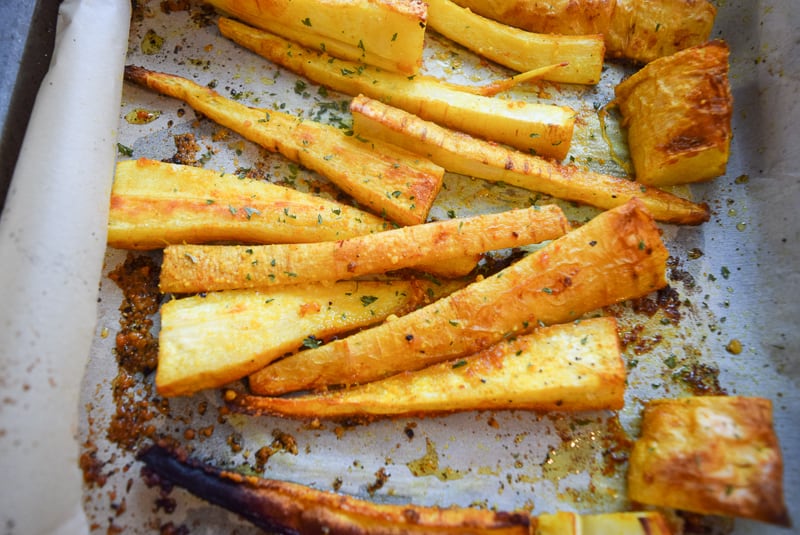
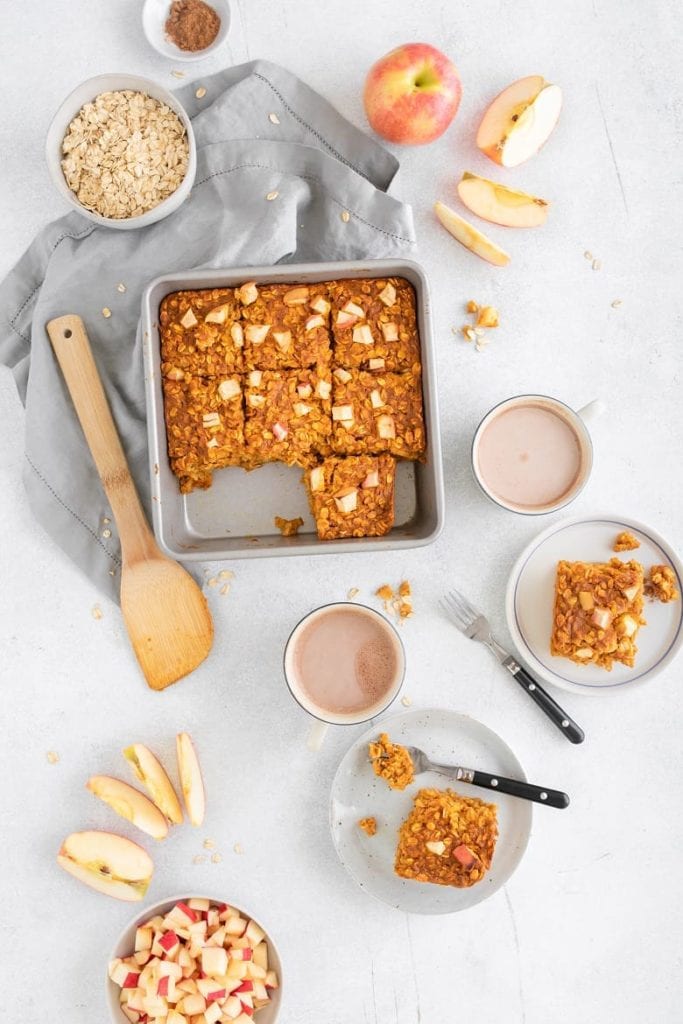

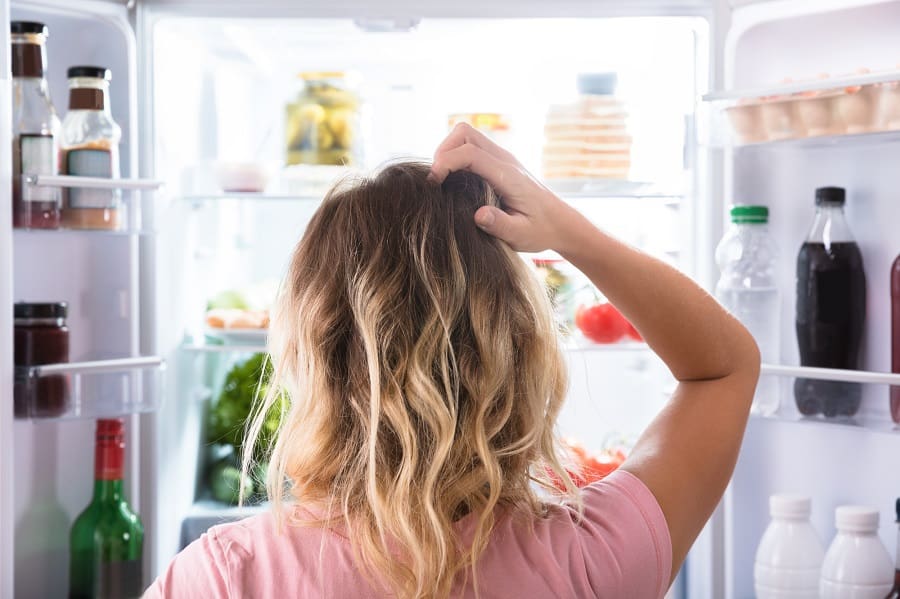
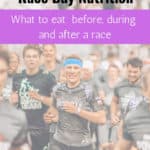
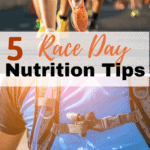
Like This Content?
Support Bucket List TummyI’ve found that eating yummy foods that sound really good to me especially when my hunger is blunted after a long race really helps with eating enough. 🙂 And toast with peanut butter + chocolate is one of my very favorite ways to pre fuel for a short race. 🙂
The best!
This is such a great post! I always struggled with finding the right fuel that worked for me when I was training for my half marathon.
This is a great guide! Also love that you included images.
This is a great guide! I usually have a piece of GF toast with almond butter before shorter races and oatmeal with a banana and almond butter before long races. Afterwards, I always go for a protein smoothie!
Toast with peanut butter and jelly work well for me for race days. Fortunately I do not have a sensitive stomach. Thanks for the tips
For my most recent half, I had a banana + PB, some Vega sport, and a few sips of coffee first thing (I usually don’t drink coffee before I run in the morning, so this is my secret for gaining an extra boost on race day). Standing on the starting line, I popped a few energy chews (I like them, but I’m not coordinated enough to chew and run at the same time), and then took a gel at mile 6. Happy to say that this strategy–plus a couple days of mindful carbohydrate consumption leading up to the race–helped fuel me to a lifetime PR!
That’s great, Shannon, Congratulations!
I loved reading about the different fueling for race day. Personally I don’t eat a ton before a short race since it’s much faster than a long race.
Pre marathon fueling – half a peanut butter sandwich before with water; water at every stop (don’t want to get dehydrated!) and gels every 35 minutes. It worked for me at Philly and I plan to do the same thing for New Jersey.
I did water at every stop for my 2nd marathon and it worked really well!